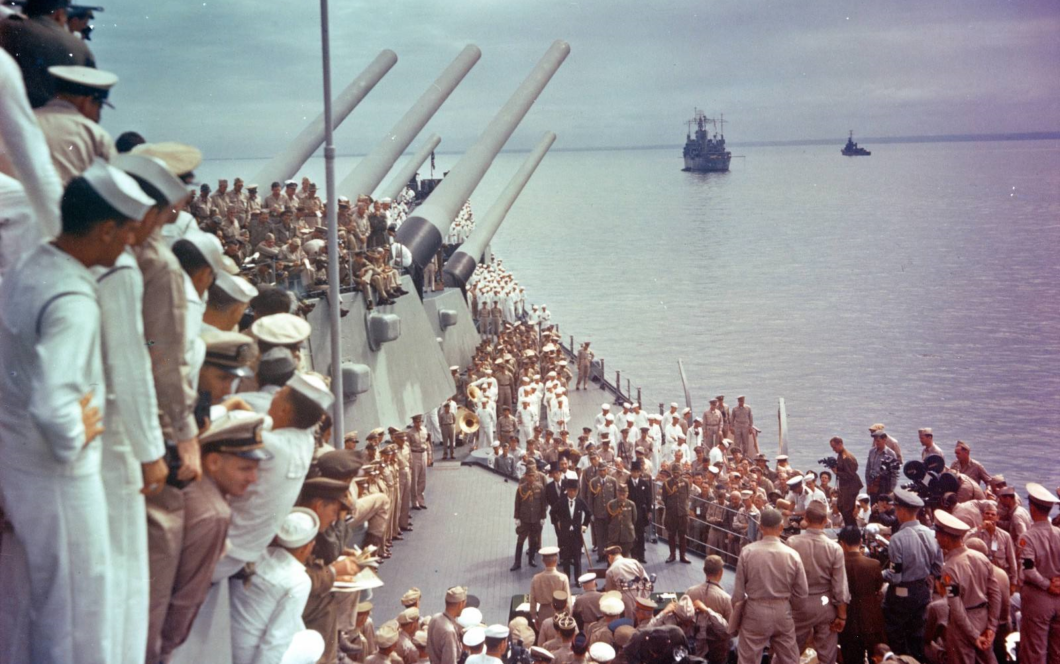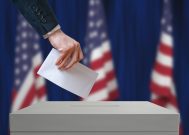World War II, Pacifist Elites, and Tyranny
The world since World War II remains largely what America made of it. Everything it didn’t destroy in war, it modified afterward. With American perseverance and protection, Germany and Japan became democracies. The U.S. helped destroy colonial empires and became involved in protracted post-colonial wars. Above all, the Cold War shaped the world and, after a long struggle, the Soviet Union collapsed. This has not led us to a happy peace, among ourselves or with the world. American triumphs have instead led us to crisis and sober reflection.
Paul Miller gives us, on the occasion of the 75th anniversary of the great triumph, America’s victory, a warning that it all looks likely to happen again. He concludes:
World War II started when preexisting national grievances met economic catastrophe, which in turn led to ideological radicalization, the rise of nationalism and authoritarianism, and eventually international aggression—all enabled by the vacuum of global leadership by liberal powers.
A practicing liberal, Miller isn’t shy in criticizing the cowardice that made for world war:
Liberalism and democracy may have been unfashionable, but they were widespread and widely understood in Europe and the United States. The problem was not that fascists won the debate, or that communists persuaded the world. The problem was that liberals were cowards, their governments were miserly, their armies were underfunded, and their leaders were passive. They did not want to lead, and fascists had bigger guns. In the face of global crisis, citizens of free nations were intent not merely on putting their interests first, but defining their interests as narrowly as possible, without regard for any notion of a shared or common good that the last global war should have taught them. And the war came.
This trenchant criticism leads us to suspect that his real concern is that liberals are once again narrow-minded cowards who speak of pacifism but think only of their own privileges. I speak crassly, but not, I think, misleadingly, and do so only pressed by the necessity actuating Miller himself—his sure knowledge that our elites are now a danger to our civil peace and have abandoned their duties. It’s not geo-politics he’s interested in so much as class analysis: it’s not even politics so much as the psychology of the liberal elite, the only plausible explanation for why people with so much power and influence could be so irresponsible. Our elites are an embarrassment even to intelligent liberals.
The Limits of Liberalism
Miller’s critique hits the mark, but what he shows us means the opposite of what he would have us believe. There’s no fixing our liberal elites—they’re adults, already educated, and in power. They listen to no one who disagrees with them and have learned nothing from their recent defeats—instead, they want everyone else to listen to them and, moreover, obey. And they have the institutional powers to compel obedience, whether in the state or Silicon Valley or academia.
Miller hopes to save liberal internationalism, a doctrine he admits has dominated American—and therefore world—elites since 1945, by separating the two terms and turning it into a kind of “conservative internationalism.” But what powers has he, or anyone, to make words into realities? He doesn’t say. Meanwhile, reality is troublesome.
International cooperation may be good, but it also produces the enemies that make cowards of us. Had we turned away from FDR’s internationalism to another Roosevelt’s ideas in our foreign policy, events might have looked different: TR’s forcefulness would jealously guard the wealth and technology of democratic regimes and would not have empowered tyrannies! Liberalism is preferable to tyranny (which Miller bashfully calls authoritarianism), but tyrants have destroyed liberals before, as he admits.
So we had better become serious. If liberal internationalism is wrong, and has been dominant since 1945, the world order is in some important way wrong. Liberal confidence has been broken by China, as well as by the terrible divisions in America and even in the European Union. The world doesn’t admire, or even listen to us, anymore.
The pious lies of the previous generations have lost their power to persuade. The idea that liberalization of economics leads to liberalization of politics has been discredited by events; as well as the idea that expert elites in the right international institutions could manipulate or incentivize political transformation in the direction of global democracy; as well as the idea that redistribution of expertise or wealth to non-democratic regimes will help democracy; even the desperate idea that power is enough, that we can bomb our enemies into submission, has failed. The belief that our speeches have the magical power to transform the world—or at least the speeches of elites, at least when backed by institutions—is fading away. Liberalism is threatened not only by China, but by increasingly mad wokies looking to take revenge on the past. And wokies lack education in and concern for international politics, the struggle of great powers, or procedural institutions—they are not Model UN students about to embark on international diplomacy in the institutions of elite liberalism, but instead barbarians inside the gates.
Why We Don’t Celebrate Our Victories
It is of great importance to us to learn how so much power has made us so weak. Were our ideas about how to succeed wrong? Is success itself dangerous? Perhaps it’s even the case that both are true, and we have many partisan opinions about who’s to blame. These tend to parade as political science or as accounts of causes and effects. Yet politics is practical. Why does no one in America, before a presidential election, offer any hopeful, enterprising, ambitious idea of the future? Why can’t we get anything done? Not only are we not achieving great things, but we’re not able to deal with the ongoing epidemic and economic catastrophe; we can’t even keep up the fantasies of previous presidential campaigns. If there’s a lie we fondly believe nowadays, it’s that we might get back to normal, not that rational expertise wielded by elites in institutional settings will lead us to the brave new world.
But our concern today is to reflect on World War II, that we may learn about ourselves and our predicament. We are unlikely to celebrate our great triumph, because we’re very unhappy, not to say scared. Nor can we agree that the great men of the conflict deserve admiration. Most liberals, alongside the wokies, would damn Generals Douglas MacArthur and George S. Patton as racist, sexist, reactionaries, and intersectionally cancel them in a heartbeat—but would America have won without them?
Not even FDR, the titan overawing the American century, is safe anymore. He’d be condemned as a racist, too. And yet we live in the ruins of the liberal order he made, at home and abroad. For all our new technology and all the institutional knowhow built through three generations, we cannot wield the awesome powers of the new American government, the empire of Washington D.C., either home or abroad.
Our diplomacy has paid the North Koreans to make nuclear weapons and our foreign policy has created horrors in the Middle East—that is, until we replaced victory and defeat with “exit strategies” and retreated. Meanwhile, China now looks more confident than America, and their elites are as arrogant as ours. Behold the result of our economic globalization. We could be forgiven for wondering: What if free markets create monsters? What if technology is essentially tyrannical, not democratic, and China will outdo us? These are the scary questions haunting us, which we dare not ask.
Sobriety about liberal arrogance does not mean we should destroy or burn down the vast liberal international institutions—but it does require we urgently destroy or discredit the education liberal elites have to offer.
We have failed FDR—we have failed the high ambitions of the liberalism that promised worldwide Progress. But perhaps we also believe those great men of 1945 failed us in turn. In turning to the false hope of perpetual international peace, they put us on a path to decadence. What if it was never possible to achieve their utopias and trying to do so has led to our failures? What if we ask too much of institutions and technology, of elites managing conflict into peace? What if it was a mistake to believe the heirs of the great liberals would live up to the expectations of 1945? This is the secret doubt haunting our elites, which might lead them to sanity, but might lead to madness instead.
The 21st Century Will Not Be Liberal
Since 2016, liberals have decided they want a redo of their great century. They’re forever warning us it’s 1933 and Hitler’s about to incinerate the world, but really, they only wish that were true. It’s a wish to be young again, to regain the moral confidence of good versus evil, and, with typical liberal arrogance, to be assured of victory in advance. Morality and science together overcoming the historical catastrophe—that’s the liberal fantasy, and we used to call it Enlightenment.
But the world today doesn’t look like the 1930s. This is why liberals prefer an easygoing fantasy of spitting on decent regimes like Hungary and Poland, or encouraging the EU to hurt them institutionally, but they’re cowards about the racist, fascist genocide going on in China, which is a reality worse than tragedy. Indeed, the problem with many of our leading liberals, as their fondness for Antifa and murderous, catastrophic riots shows, is that, far from being the next Churchill, they might be fascists instead. When vast violence erupts in cities liberals have one-party control of, they do not protect citizens or property, nor do they enforce the laws. They instead seem to encourage violence for months in Portland. Indeed, in Seattle we see the white, often collegiate Antifa who might lynch a black woman, the former police chief, who resigned because the liberal elites running Seattle’s city council wouldn’t protect her home, cut police budgets, and cut her salary in half, too. And in Chicago, the looters gleefully post video of themselves committing crimes while the authorities eagerly increase the rates at which they drop charges of murder. Promoting street violence and forgiving murder is Nazi stuff, not democratic rule of law.
The problem indeed, is not merely or primarily the mobs, but the elites who enable them. However successful they might be in America, their influence internationally is dwindling. Harvard, D.C., and Silicon Valley don’t really impress China. Therefore, they impress other regional powers in Asia less and less. This is as true of Russia as of India; as of Pakistan and Indonesia; and as America falters and China rises in the West Pacific, what will Japan do? Globalization is over and everything from the soil under our feet to the internet up in the skies is all about different authorities isolating from each other.
Generations of our arrogant liberals did not spend their long years of education learning other languages, studying the politics and history of other peoples, and as a result, we lack both intelligence and journalism to inform us about the important things going on abroad. We’re not scientifically ahead of events and reacting intelligently, not to say shaping events, whatever liberals might claim. We’ve ended up with arrogant, parochial elites that despise their country’s legacy. They are not the future. They do not even have a good guess about what the future will bring, except that it will be bad.
Liberty Renewed
Sobriety about liberal arrogance does not mean we should destroy or burn down the vast liberal international institutions—but it does require we urgently destroy or discredit the education liberal elites have to offer. World War II is the greatest war and deserves the most serious study. It destroyed the fantasies of pacifists, but not the pacifists themselves. After all, they went right back to fantasizing, without skipping a beat to say they were sorry or that maybe other people should run our institutions. The deluded elites (like the NYT’s Walter Duranty who allowed budding tyranny to turn into world war and the nuclear-armed Soviet Union) never had to say they’re sorry. We must not follow such elites or their ideas, but instead study human nature, and that means returning to the thought of the great men that led us through the war: FDR, Churchill, De Gaulle. And we must study the great generals who fought for them.
Instead of arrogant liberals, let us remember that it was mostly Christian and Jewish patriots without college educations who made up the armies that destroyed the tyrannies of Germany and Japan. The decadent elites of the 20s and 30s who promised liberal pacifism and diplomatic outlawing of war collapsed in cowardice. But the young men liberals today might call fascists, nationalists, racists, reactionaries, or what have you killed and died and saved their countries, civilization, and any possibility of a decent way of life. Our liberals are morally inferior to those G.I.’s and they are intellectually, not only morally, inferior to Churchill.
To conclude, we need another kind of liberty, one which accepts the tragedy of war, rejects mad utopian schemes, and respects the citizenry rather than running social experiments, through government and technology, on us. The test is simple: If our elites hate American Christians more than they do the rulers of the Chinese Communist party, we are in terrible peril. The world is not going back to the 20th century, but our liberals have never really moved past those halcyon days when they had run of the world. They still don’t want to help the rest of us and they still don’t want to harm our enemies. World War II reminds us that liberals themselves used to be far more patriotic and how new the accusation that most Americans are evil—white supremacy, systemic racism, etc.—really is, which the NYT now seems to publish daily.
If we learn nothing else from World War II’s legacy, it is that we need new, patriotic elites who have learned from the past and are willing to face our present danger.



